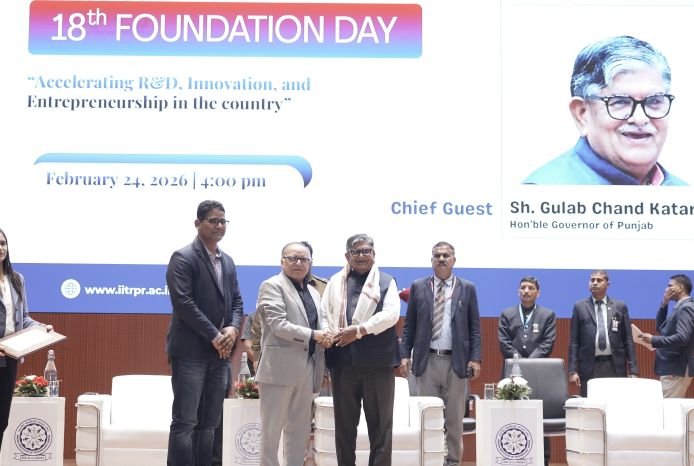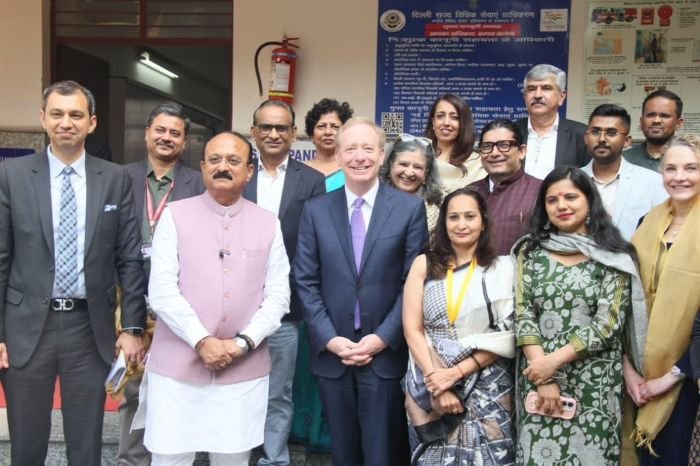
Nagar Nigam Pratibha Baalika Vidhyalaya (NPBV) Dilshad Colony-Delhi and Oberoi International School-Mumbai in Community collaboration, The Riverside School-Ahmedabad for innovation, Snehalaya English Medium School– Ahmednagar for Overcoming Adversity, Shindewadi Mumbai Public School (The Akanshka Foundation)-Mumbai for Supporting Healthy Lives are inspirational schools named in the Top 10 shortlists for the $250,000 World’s Best School Prizes.
The five World’s Best School Prizes – for Community Collaboration, Environmental Action, Innovation, Overcoming Adversity, and Supporting Healthy Lives – celebrate schools everywhere for the pivotal role they play in developing the next generation of learners and for their enormous contribution to society’s progress, especially in the wake of COVID. The Prizes were established to share the best practices of schools that are transforming the lives of their students and making a real difference to their communities. The five World’s Best School Prizes, founded 2022 by T4 Education in collaboration with Accenture, American Express, Yayasan Hasanah, and the Lemann Foundation are prestigious education prizes.
Vikas Pota, Founder of T4 Education and the World’s Best School Prizes, said:
“The schools shortlisted for the World’s Best School Prizes, no matter where they can be found or what they teach, all have one thing in common. They all have a strong school culture. Their leaders know how to attract and motivate exceptional educators, inspire change, and build excellent teaching and learning environments. Schools across the globe will learn from the story of these trailblazing Indian institutions and the culture they have cultivated.”
Next steps:
The Top 3 finalists for each of the five World’s Best School Prizes will be announced in September 2023 followed by the winners in October. The winner of each Prize will be chosen based on rigorous criteria by a Judging Academy comprising distinguished leaders across the globe including academics, educators, NGOs, social entrepreneurs, government, civil society, and the private sector.
A prize of US$250,000 will be equally shared among the winners of the five Prizes, with each receiving an award of US$50,000.
All 50 shortlisted schools will be invited to share their best practices through events on the T4 Communities app or School Transformation Toolkits that showcase their “secret sauce” to innovative approaches and step-by-step instructions on how others can replicate their methods to help improve education everywhere.
The Chosen 5: Why were these schools chosen?
Nagar Nigam Pratibha Baalika Vidhyalaya (NPBV) F- Block, Dilshad Colony-1st, a government school in Delhi, India, has broken through the traditional mould to provide community-based interventions and support to bridge the gap between teachers, students, and parents. The school’s Family Champion programme has empowered parents to become leaders in their communities, thanks to which 65 out-of-school children have re-enrolled in school. With the school community’s collaborative efforts, NPBV F-Block, Dilshad Colony-1st has redefined community engagement and proven that it can lead to exceptional success.
In 2020, the school’s teachers began to notice a growing disconnect between the students and their studies, mainly due to the COVID-19 lockdowns and the community feeling overwhelmed with their financial situation and other insecurities. In response, the school developed and launched its Family Champion programme to help students and their families to navigate the challenges of remote learning and stay engaged with their education.
The community parents, known as Family Champions, received a need analysis, baseline assessment, and continue to receive two training sessions per month led by Kshamtalaya Foundation to prepare them for their roles as educators and teacher leaders. In its first year, the programme onboarded 35 Family Champions, who focused on strategies for engaging children in learning at home, COVID and vaccination awareness, and self-care.
The programme then led to 54 community learning centres, 61 parent learning ambassadors, and home-based learning support, beginning with 30 Family Champion-led Learning Circles – collaborative and participatory learning groups – across the community. As a result, 90% of Family Champions have reported feeling more confident holding conversations with parents and teachers. The Learning Circles benefited 1,665 children in the past three years from 2020-23. This demonstrates the programme’s importance in building capacity, empowering parents, and improving children’s foundational literacy and numeracy skills in the community.
Oberoi International School, an independent international school in Mumbai, India, brings hope, empathy, and shared possibility to its students and surrounding communities. The school’s multifold approach to community collaboration includes community service projects, cooperative learning, peer-to-peer learning, skill sharing, and mentorship programmes. The collaborations have not only focused on addressing community needs but also on engagement with the communities, to learn about social issues and develop leadership skills.
The resulting awareness and empathy have led to several meaningful student-led initiatives, like the Unified Theatre, a collaboration with Priyanj Special School, which involves students from both schools working together, sharing resources, and staging plays, with proceeds donated to charity. Another initiative is Project Chirag, which entails organising fundraising events and then visiting rural villages to construct solar panels. Throughout the process, the students actively engage with the local community and school children, fostering meaningful interactions and creating a positive impact. By combining their efforts with hands-on involvement, the students are not only addressing the energy needs of these villages but also establishing valuable connections and knowledge-sharing opportunities with the residents.
The school has also partnered with Habitat for Humanity to build homes for the underprivileged, organised fundraisers for food distribution drives, and facilitated Relay for Life events, which raised INR 2,00,000 for the MESH Foundation and Tata Memorial Hospital.
The Riverside School, an independent international school in Ahmedabad, Gujarat, India, has gained worldwide recognition for its groundbreaking, student-centric approach to education, particularly through its I CAN pedagogical model and the introduction of the FEEL, IMAGINE, DO, and SHARE (FIDS) programme. By integrating an intentional value system of empathy, ethics, excellence, elevation, and evolution with the academic curriculum, the school has consistently ranked amongst the top 10 schools in India since 2004.
Inspired by the founder’s own son’s academic struggles, Riverside used Design Thinking to develop a school-wide teaching and learning culture of agency, engagement, and creativity. Today, FIDS is also an online training platform used by many schools worldwide and has inspired children worldwide to become changemakers. The platform has reached 2 million children through the Design for Change School, and Riverside has conducted state-wide, remote and in-person workshops to train over 1,000 government school teachers in the FIDS framework and its application in their contexts.
Riverside also has a research and training branch, Riverside Learning Center (RLC). RLC has codified tried and tested 20+ years of I CAN processes and practices to make design thinking in Education and use of FIDS mainstream. The I CAN Platform houses these processes and practices and uses the FIDS framework to explain the pedagogical model’s rationale and impact. It also provides multiple how-to’s and videos to share what good practice looks like.
Overall, the Riverside School has had a significant impact on education through its student-centric approach, innovative pedagogical model, and the widespread dissemination of the FIDS programme. By cultivating empathy, creativity, and social responsibility in students, the school has enabled and empowered its pupils to become aware and active citizen leaders of the world.
Snehalaya English Medium School, a charity school in Ahmednagar, Maharashtra, India, has transformed the lives of children living with HIV/AIDS and those from sex worker families, breaking down stigmas and paving the way for a brighter future. With the 70% admissions rate from families outside the charity and a 100% pass rate in their 10th Std, all while carrying out efforts to end second-generation prostitution in its district, Snehalaya English Medium School is rewriting the narrative for marginalised communities in semi-rural India.
With 25% of the school’s students being HIV+ and an even higher number being children of sex workers, the school’s students face systemic discrimination.The school overcame initial challenges in recruiting students who did not come from these disadvantaged backgrounds by connecting with village leaders who hosted meetings with parents to openly discuss and allay their concerns. By convincing parents that the school’s benefits and results far outweighed the perceived associated risks, Snehalaya English Medium School managed to recruit a diverse range of students.
Besides bringing this change through affordable and quality education, Snehalaya English Medium School believes in empowering students beyond the classroom, enabling them to learn from changemakers, international volunteers, teachers, leaders, and social workers, inspiring them to become socially aware and accepting. In this way, Snehalaya English Medium School has put an end to second-generation prostitution in its district and is helping many of their children achieve great careers, breaking the cycles of poverty and exploitation.
At the same time, it has invited other schools to visit and use its facilities, further breaking down stereotypes. The school also invited social activists to raise awareness of the issues they were tackling, invoking a sense of responsibility for the world we live in.
Snehalaya English Medium School does not deny, however, that some of its students, due to their circumstances, may require additional attention, and so the school offers sports sessions and playtimes to give students the opportunity to release unspent energy. Additionally, the school has four counsellors on hand for one-to-one support as and when required, both for students and their teachers, families, or caregivers.
Shindewadi Mumbai Public School (The Akanshka Foundation), a charter school in Mumbai, India, is attempting to reverse the impact of low immunity and poor nutrition among its student body and wider community after the lockdown. The school has more than doubled the number of children to healthy weight, proving that its comprehensive programme is both robust and effective in promoting healthy lifestyles.
In its 14-year history, the school’s focus has changed along with its growth, but the one constant has been the health and nutrition of its students, with a record of malnourishment in the community. The COVID-19 lockdowns in particular had a severe impact on the health and nutrition, with 235 students – or roughly 50% of the student body – underweight when the school reopened, 103 of whom were severely malnourished, and only 31 students in the whole school at a healthy weight.
To address this issue, the school implemented a comprehensive programme that included awareness sessions, parent meetings, community events, nutritional monitoring of school meals, and initiatives to promote healthy food choices. One such initiative was the school’s “9 days, 9 colours, 9 recipes” event, which took place during the 9-day Navaratri festival and highlighted the importance of eating colourful and healthy food. The initiative saw 350 women take part, with several of them demonstrating and sharing low-cost, healthy recipes.
Shindewadi Mumbai Public School’s multifaceted approach also includes collaborating with the Indian Council of Medical Research for counselling and dietary suggestions for its underweight students. The school management committee monitors the nutritional value and taste of the government-provided midday meal and pushes for changes in vendors when required to improve quality. Additionally, the school requires every student to bring a healthy lunch from home, with teachers making sure that food gets eaten.
As a result of its efforts, all 103 severely undernourished students have gained at least 1.5kg and student families have become much more involved in learning about and implementing healthy eating habits.








